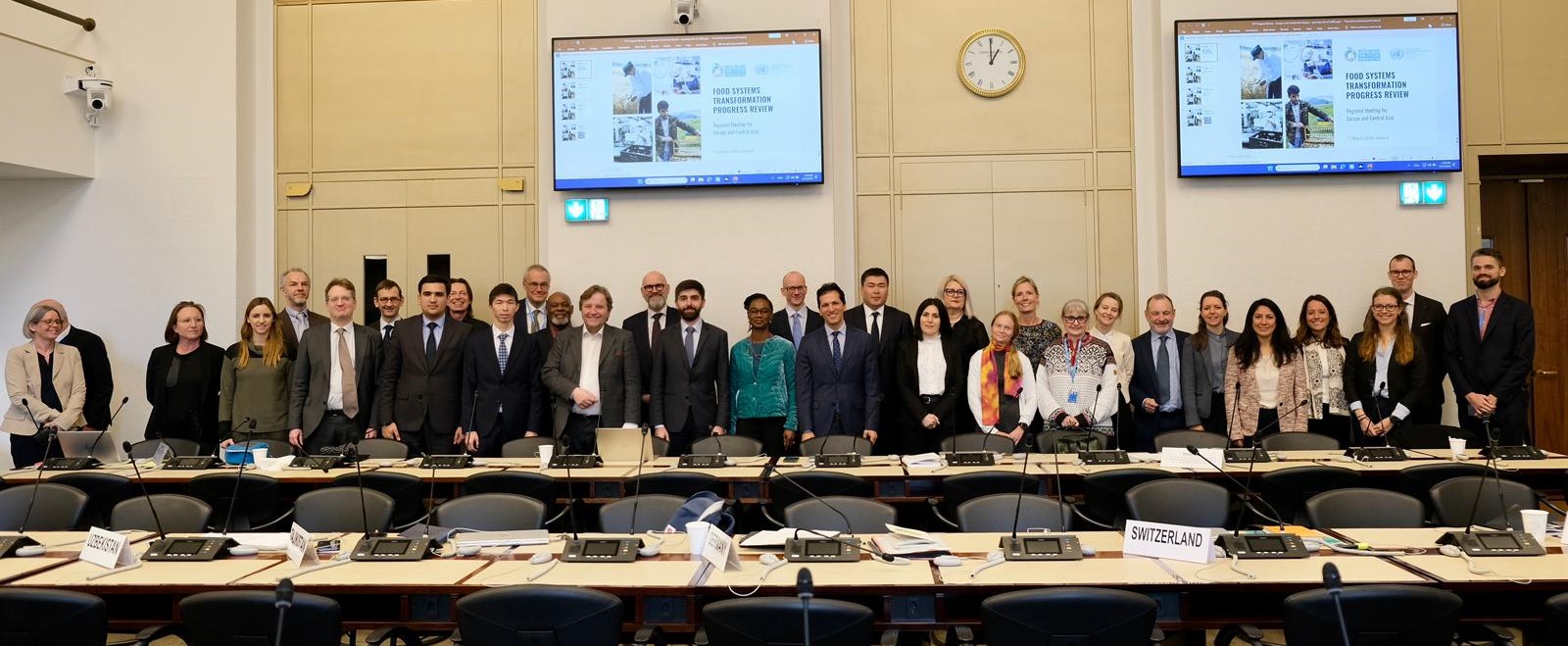Regional insights: National Convenors review food systems transformation progress in Europe and Central Asia

Geneva, Switzerland: In Geneva, at the 2024 Regional Forum on Sustainable Development for the UNECE Region, two events were convened by the UN Food Systems Coordination Hub and the UN Issue-based Coalition on Sustainable Food Systems, focusing on the transformative journey of food systems within Europe and Central Asia (ECA). These events were instrumental in assessing the transformative progress of food systems across ECA, creating a vital platform for dialogue among the UN Food Systems Coordination Hub, Food Systems National Convenors, experts, and key stakeholders from civil society and international organizations.
The Regional Meeting with National Convenors for Europe and Central Asia
On 12 March 2024, the second Regional Meeting for Europe and Central Asia since the 2021 UN Food Systems Summit (UNFSS) convened, building on the momentum of significant milestones such as the UNFSS+2 Stocktaking Moment, the SDGs Summit, COP28, the EU Farm to Fork strategy, the Samarkand Declaration and the recent communique from the Global Forum for Food and Agriculture in Berlin. The goal was to unite National Convenors and other experts to assess the advancements and challenges in food systems transformation, encourage the exchange of knowledge, and pinpoint solutions for emerging challenges.
Opening remarks from Ms. Elisabeth Türk, Director of the Economic Cooperation and Trade Division (ECTD) at the United Nations Economic Commission for Europe (UNECE), underscored the critical need for regional cooperation to address the challenges of food systems affordability, environmental sustainability, and conflict. Mr. Viorel Gutu, Co-chair of the UN Issued Based Coalition on Sustainable Food Systems and FAO Regional Representative for ECA , along with Ms. Sylvia Ekra, Deputy Director of the UN Food Systems Coordination Hub, highlighted the essential role of food systems as catalysts for the Sustainable Development Goals (SDGs) and the growing integration of food systems transformation into national sustainable development strategies. Dr. Francesco Branca from the Wolrd Health Organization (WHO) provided an alarming overview of the double burden of malnutrition and obesity in the region, highlighting the need to create a strong policy convergence on the nexus food-health-climate. With 39 National Convenors and 26 national pathways developed, the ECA region stands on the cusp of significant advancements in overcoming food systems challenges.
A regional imperative for ECA: transforming food systems in a holistic way
Participants recognized the unique challenges of the ECA region, highlighting main priorities, systemic realities and constraints and outlining subnational dynamics and nuances in the policy priorities.
Discussions emphasized priorities ranging from developing healthy dietary guidelines, strengthening agroecology and smallholder support to combating food loss and waste, and advocating for a holistic approach to transformation. The integration of food systems and climate change agendas emerged as a central theme, focusing on mitigating greenhouse gas emissions, adapting to climate change impacts and advancing climate-resilient agriculture. The Hub's Convergence Initiative was presented as a vital mechanism for stimulating dialogue, evidence-based decision-making, and innovative practices leading to action in both the climate and food systems tracks and supporting the achievement of the SDGs.
Collaboration and strategy: national approaches and multilateral efforts
The meeting showcased the diverse strategies implemented by ECA countries throughout the region, each contributing to the global pursuit of sustainable food systems, with the unleashing power of the accelerators of action, such as through science and technology, finance, and education. National pathways and strategies are embedded in comprehensive government programmes, addressing various sectors to tackle food insecurity, nutrition and healthy diets, climate change, natural resource management, and addressing all forms of sustainability. A wide range of solutions were also implemented by various stakeholders both globally and within the region to address the negative consequences of the crises, including food inflation, trade, agricultural production, food security and access to affordable healthy diets for vulnerable populations.
Accelerating the SDGs and climate action through food systems
On 13 March 2024, a side event titled " Food Systems Transformation as an Accelerator for the SDGs Implementation and Climate Action" further explored the role of sustainable practices within food systems. Mr. Dmitry Maryasin, Deputy Executive Secretary of UNECE, called for global leadership in reevaluating consumption patterns and embracing circular economy principles to mitigate the impacts of climate change, highlighting the significant contribution of food systems to greenhouse gas emissions and water usage. Insights from the Regional Meeting with National Convenors were shared by Mr. Jyri Ollila, National Convenor from Finland, noting rapid updates to national pathways post-UNFSS+2, ongoing challenges, and the importance of these regional gatherings of National Convenors to share experiences and good practices.
Youth representative Mr. Alexis Balimann, Switzerland Climate Youth Delegate, underscored the importance of youth engagement in shaping climate-smart food systems, advocating for increased youth representation in decision-making processes and the establishment of youth councils.
Panel discussions illuminated the crucial nexus between food systems, health, and nutrition, the coherence of policies, and the roles of research, academia, and the private sector in supporting transformation. The discussions underscored the importance of targeted policy responses, the integration of climate and food in policy frameworks, and the need for context-specific innovation and funding opportunities, aligning with the UN Secretary-General's Call to Action.
These events not only underscored the imperative for transformative action in food systems but also showcased the collective determination of Europe and Central Asia to address these challenges head-on. Through regional collaboration, the integration of sustainable practices, and a focus on innovative solutions, these meetings marked a significant stride toward re-envisioning and revitalizing regional food systems in line with the SDGs and climate action goals.
Watch the side event
